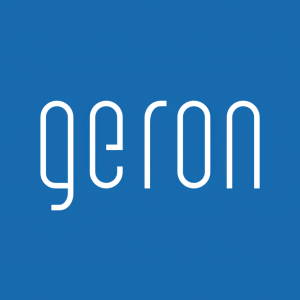Geron Announces ASCO Presentation Reporting Durable Continuous Transfusion Independence with Imetelstat in IMerge Phase 3 Lower Risk MDS Patients
- Primary endpoint of 8-week transfusion independence (TI) significantly higher with imetelstat vs. placebo (P<0.001), with median TI duration approaching one year for imetelstat 8-week TI responders
- Statistically significant and clinically meaningful efficacy results achieved across key MDS subgroups: ring sideroblast (RS) status, baseline transfusion burden and IPSS risk category
- Safety results consistent with prior imetelstat clinical experience
- Reduction in variant allele frequency (VAF) of genes commonly mutated in MDS and their correlation with clinical endpoints support disease-modifying potential of imetelstat
-
Data support NDA submission which is on track for June 2023 to support potential
U.S. commercial launch in first half of 2024
“The presentation at ASCO of our IMerge Phase 3 data highlighted the meaningful longer-term duration of transfusion independence with imetelstat compared to placebo, as well as significantly higher rates of TI across MDS subgroups, greater reductions in transfusion units and sustained increases in hemoglobin levels,” said Faye Feller, M.D., Executive Vice President, Chief Medical Officer of Geron. “With our
IMerge Phase 3 enrolled lower risk MDS patients who were relapsed after, refractory to, or ineligible for erythropoiesis stimulating agent (ESA) treatment and were transfusion dependent, defined as requiring at least four units of packed red blood cells (RBCs) over an eight-week period. The ASCO presentation reported IMerge Phase 3 results with a data cut-off of October 2022, the same for top-line results reported in January 2023. The primary endpoint of 8-week transfusion independence (TI) was met with high statistical significance (P<0.001) for imetelstat-treated patients (
Mean hemoglobin levels in imetelstat-treated patients increased significantly (P<0.001) over time compared to placebo patients. For patients achieving 8-week TI, median increases in hemoglobin were 3.6 g/dL for imetelstat and 0.8 g/dL for placebo. Imetelstat-treated patients also experienced a statistically significant (P=0.042) and clinically meaningful mean reduction in RBC transfusion units compared to placebo. A highly statistically significant (P<0.001) hematologic improvement-erythroid (HI-E) rate was achieved for imetelstat (
Significantly higher 8-week TI rates were observed with imetelstat vs. placebo across key lower risk MDS subgroups, including ring sideroblast (RS) status, baseline transfusion burden and IPSS risk category, with similar 8-week TI responses seen for imetelstat within each subgroup category.
“The IMerge Phase 3 results are especially encouraging because of the significant unmet need in lower risk MDS patients with symptomatic anemia needing regular red blood cell transfusions, especially with less than half of such patients responding to frontline ESA therapy, and most of those who do respond losing that response in less than two years,” said Amer Methqal Zeidan, MBBS MHS, Associate Professor of Internal Medicine (Hematology) and director of hematology Early Therapy Research at Yale School of Medicine and Yale Cancer Center, who presented the data at ASCO and is an IMerge lead investigator. “Based on the IMerge trial results, I believe imetelstat represents an important and novel option for patients with lower risk MDS after ESA failure, particularly in terms of the high response rate, durability of response, significant and sustained hemoglobin increase in responders, the preliminary evidence of disease modification across the mutational spectrum of the disease and considering the manageable and reversible adverse event profile. This potential treatment option is especially important for patients with high transfusion burden and those without ring sideroblasts who have high unmet need.”
The safety profile observed with imetelstat in IMerge Phase 3 was consistent with prior clinical experience with no new safety signals. Non-hematologic adverse events (AEs) were generally low grade. No cases of Hy’s Law or drug-induced liver injury were observed, and the incidence of grade 3 liver function test laboratory abnormalities was similar between imetelstat and placebo groups. Grade 3-4 thrombocytopenia and neutropenia were the most frequently reported hematologic AEs and were most often reported during Cycles 1-3. These cytopenias resolved within two weeks, and over
Most AEs leading to dose modifications were grade 3-4 neutropenia and thrombocytopenia. Although approximately
Reductions in variant allele frequency (VAF) of genes frequently mutated in MDS were greater for imetelstat-treated patients vs. placebo: SF3B1 (P< 0.001), TET2 (P= 0.032), DNMT3A (P= 0.019) and ASXL1 (P=0.146). SF3B1 VAF reduction correlated with a greater increase in hemoglobin (P< 0.001) and longer TI duration (P< 0.001). A greater VAF reduction in TET2, DNMT3A or ASXL1 also correlated with longer TI duration. Such correlations support the disease-modifying potential of imetelstat.
The presentation slides are available on the Publications section of Geron’s website: https://www.geron.com/research-and-development/publications/.
About IMerge Phase 3
The Phase 3 portion of the IMerge Phase 2/3 study is a double-blind, 2:1 randomized, placebo-controlled clinical trial to evaluate imetelstat in patients with IPSS Low or Intermediate-1 risk (lower risk) transfusion dependent MDS who were relapsed after, refractory to, or ineligible for, erythropoiesis stimulating agent (ESA) treatment, had not received prior treatment with either a HMA or lenalidomide and were non-del(5q). To be eligible for IMerge Phase 3, patients were required to be transfusion dependent, defined as requiring at least four units of packed red blood cells (RBCs), over an eight-week period during the 16 weeks prior to entry into the trial. The primary efficacy endpoint of IMerge Phase 3 is the rate of red blood cell transfusion independence (RBC-TI) lasting at least eight weeks, defined as the proportion of patients without any RBC transfusion for at least eight consecutive weeks since entry to the trial (8-week TI). Key secondary endpoints include the rate of RBC-TI lasting at least 24 weeks (24-week TI), the duration of TI and the rate of hematologic improvement erythroid (HI-E), which is defined under 2006 IWG criteria as a rise in hemoglobin of at least 1.5 g/dL above the pretreatment level for at least eight weeks or a reduction of at least four units of RBC transfusions over eight weeks compared with the prior RBC transfusion burden. A total of 178 patients were enrolled in IMerge Phase 3 across
About Imetelstat
Imetelstat is a novel, first-in-class telomerase inhibitor exclusively owned by Geron and being developed in hematologic malignancies. Data from non-clinical studies and clinical trials of imetelstat provide strong evidence that imetelstat targets telomerase to inhibit the uncontrolled proliferation of malignant stem and progenitor cells in myeloid hematologic malignancies resulting in malignant cell apoptosis and potential disease-modifying activity. Imetelstat has been granted Fast Track designation by the
About Geron
Geron is a late-stage biopharmaceutical company pursuing therapies with the potential to extend and enrich the lives of patients living with hematologic malignancies. Our first-in-class telomerase inhibitor, imetelstat, harnesses Nobel Prize-winning science in a treatment that may alter the underlying drivers of disease. Geron currently has two Phase 3 pivotal clinical trials underway evaluating imetelstat in lower risk myelodysplastic syndromes (LR MDS), and in relapsed/refractory myelofibrosis (MF). To learn more, visit www.geron.com or follow us on LinkedIn.
Use of Forward-Looking Statements
Except for the historical information contained herein, this press release contains forward-looking statements made pursuant to the “safe harbor” provisions of the Private Securities Litigation Reform Act of 1995. Investors are cautioned that such statements, include, without limitation, those regarding: (i) that for IMerge Phase 3, Geron plans to submit a New Drug Application in the
View source version on businesswire.com: https://www.businesswire.com/news/home/20230602005223/en/
Aron Feingold
Investor and Media Relations
investor@geron.com
media@geron.com
Source: Geron Corporation







